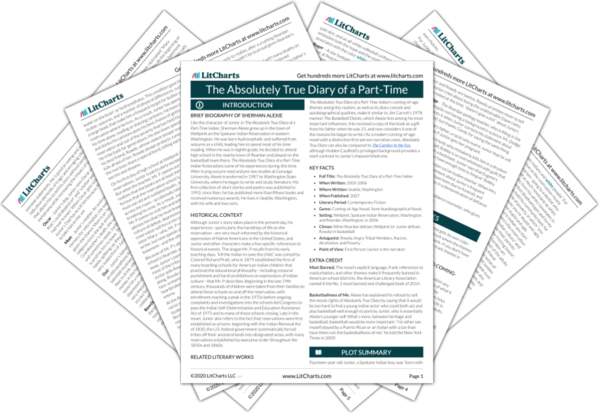One unique aspect of Absolutely True Diary is the way that images are incorporated into the text. Junior is an aspiring cartoonist who uses his drawings to tell his story, and the cartoons work throughout the novel in several different and important ways. Sometimes they are integrated seamlessly with the written narrative, providing dialogue or visual information that isn’t shown elsewhere; for instance, the moment when Junior throws his geometry book and breaks Mr. P.’s nose is shown in a picture rather than told in a sentence, as if Junior’s feelings are too strong to articulate in words. Some reveal Junior’s attitude toward other characters; he takes special care in sketching his friends Rowdy, Gordy, and Penelope, and these portraits help to characterize both the artist and the subjects. Still others, like “Junior Gets to School” or “Who My Parents Would Have Been If Somebody Had Paid Attention to Their Dreams,” are like self-contained diagrams or infographics; they explain what’s going on in the text in a different, visual way. As Junior explains, “I draw because I want to pay attention to the world. And I want the world to pay attention to me.”
At the beginning of the novel, Junior sees his cartoons, and his skill as an artist, as his one chance of leaving the reservation: “tiny little lifeboats” in a world of “broken dams and floods.” In a similar way, his older sister Mary once dreamed of writing romance novels; Junior sees it as tragic that she gives up on those dreams after she graduates high school. Words become even more important to him after he gets to Reardan, and his new friend Gordy teaches him to read seriously and joyfully—an approach that, Junior notes, should apply both to books and life. Mary’s romance novels are more complicated, though. When she suddenly gets married, moves to Montana, and begins writing a memoir, her life seems to be unfolding like something out of one of her stories—until she dies in a tragic, senseless accident, suggesting that the possibility of a better life might sometimes be just a fantasy and that the connection between books and life cannot be so straightforward.
Drawing, Writing, and Junior’s Cartoons ThemeTracker

Drawing, Writing, and Junior’s Cartoons Quotes in The Absolutely True Diary of a Part-Time Indian
My brain was drowning in grease.
But that makes the whole thing sound weirdo and funny, like my brain was a giant French fry, so it seems more serious and poetic and accurate to say, “I was born with water on the brain.”
I think the world is a series of broken dams and floods, and my cartoons are tiny little lifeboats.
Gordy gave me this book by a Russian dude named Tolstoy, who wrote: “Happy families are all alike; every unhappy family is unhappy in its own way.” Well, I hate to argue with a Russian genius, but Tolstoy didn’t know Indians. And he didn’t know that all Indian families are unhappy for the same exact reason: the fricking booze.
I realized that, sure, I was a Spokane Indian. I belonged to that tribe. But I also belonged to the tribe of American immigrants. And to the tribe of basketball players. And to the tribe of bookworms.
And to the tribe of cartoonists.
And to the tribe of chronic masturbators.
And the tribe of teenage boys.
And the tribe of small-town kids.
And the tribe of Pacific Northwesterners.
And the tribe of tortilla-chips-and-salsa lovers.
And the tribe of poverty.
And the tribe of funeral-goers.
And the tribe of beloved sons.
And the tribe of boys who really missed their best friends.
It was a huge realization.
And that’s when I knew that I was going to be okay.
















